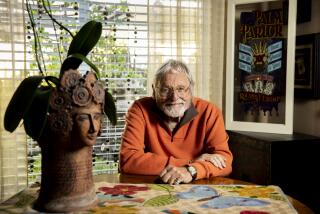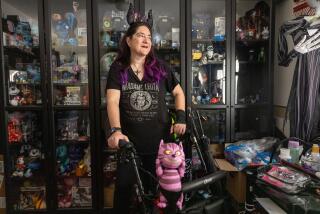He Made the Music--Now She Wants Disney to Face It
Coming from anyone other than Tommy Walker’s widow, the complaint about Disneyland might have ended up in the wastebasket. After all, everyone’s unhappy about something.
But when I met Lucille Walker at her home in Irvine, and learned of her husband’s extraordinary life, and leafed through a scrapbook of his achievements, and scanned the wall in their den that is jammed with photos from Tommy’s life, I realized hers was no attention-seeking letter.
Nope. This one was from the heart.
From her heart and, possibly, from Tommy’s too.
Before getting to her complaint, a little about Tommy Walker. Born in Milwaukee, he was the son of Vesey Walker, a band director who, according to a Disneyland press release from 1967, organized more than 50 college, military, school and youth bands. His local American Legion from Wisconsin won an international competition in 1934, with 11-year-old Tommy as a member. Vesey Walker, according to Lucille Walker and various newspaper articles, was the inspiration for “The Music Man.”
Being in the band, you might say, was in Tommy Walker’s genes. He attended USC and was drum major. Oddly enough, he was also the team’s place-kicker, becoming known as “Tommy the Toe” and wearing his band uniform over his football jersey on game day. One photo shows Tommy teeing up a football, wearing his Trojan shako. Good enough to be drafted by the Washington Redskins, he opted to become USC’s band director.
In late 1954, Walt Disney hired him to stage the Disneyland opening the following summer. For the next 12 years, Walker was Disneyland’s entertainment director. His father, Vesey, formed the original Disneyland Band.
Tommy Walker left Disney in 1966 and went on to a spectacular career, producing pageants for, among other things, the 1980 and 1984 Olympic Games, the 1986 Statue of Liberty celebration and Ronald Reagan’s 1981 inauguration. He produced extravaganzas for three Super Bowls, 11 Pro Bowls and World’s Fairs in four cities. One New York newspaper headlined an article, “Tommy Walker Lights Up the Night.”
In 1986, during his third open-heart surgery in 10 years, Tommy Walker died. He was 63.
That is a fraction of the history that brings Lucille Walker to her present gripe.
One of Tommy’s passions, Lucille Walker says, was his belief in involving young people in music. When I mentioned the movie “Mr. Holland’s Opus,” she said, “That could have been Tommy’s story, only more.” He encouraged local marching bands to perform at Disneyland and conceived other youth-related programs, she said.
As such, high school marching bands have performed at Disneyland for years. Historically, local bands played and then could stay in the park for free.
Under a new policy, though, Disneyland now charges band members $25 each to remain in the park.
Lucille Walker is outraged, saying it represents nothing short of corporate greed and will discourage some band members from being able to play. “Here they come to Disneyland to play, and they’re being charged $25 if they want to stay in the park,” Lucille Walker fumed. “Kids can’t afford that. If Disney can’t afford $25 for each kid that plays, that’s pretty sick.”
I made a call to one local high school band director, and he agreed with that assessment. “I think it’s a tragedy for Southern California music education,” he said. “One of the biggest things that motivates my group is to perform at Disneyland.” He noted that the students’ appearances often induce their parents, who pay admission, to come to Disneyland and that students and parents spend other money at the park on concessions and souvenirs.
Disneyland spokesman Tom Brocato disagrees that the new policy, which went into effect March 1, will discourage participation. He conceded, however, that economics drove the new policy, saying the complimentary package of admission and gifts given to the band members has become “unfeasible.” Some 1,300 groups from the Southern California area have performed under the Magic Music Days program, he said, adding that it has grown 400% in the last 10 years.
Brocato said it would be unfair to question Disneyland’s support of music. “We’re committed to support of the arts,” he said. For example, he said, a program aimed at second-graders essentially “introduces them to American band music” by exposing them to both contemporary and classical music.
I asked Lucille Walker why she was going public with her complaint. “I’m doing it in Tommy’s name. For Tommy and Vesey, who would have been so upset, because they put so many years into Disneyland. Tommy believed so much in young people having opportunities to perform. And Disneyland was such a big deal to kids. It’s just another erosion of programs for youth. We complain that they’re into drugs or whatever. Disney should be the leaders in getting them into bands and into performing, not turning them away.”
We can’t know for sure what Tommy Walker would have said about the new policy. Lucille Walker, who was his business partner and spent the last 14 years of his life with him, has no doubts.
“Tommy and Walt had a very personal relationship,” she says. “Both were creative people. They didn’t like the finance people telling them, ‘You can’t do this.’ And they were always telling Walt he couldn’t do something. I’m sure he and Walt are both going nuts, thinking what has happened at Disneyland.”
Dana Parsons’ columns appears Wednesday, Friday and Sunday. Readers may reach Parsons by writing to him at the Times Orange County Edition, 1375 Sunflower Ave., Costa Mesa, CA 92626, or calling (714) 966-7821.
More to Read
The biggest entertainment stories
Get our big stories about Hollywood, film, television, music, arts, culture and more right in your inbox as soon as they publish.
You may occasionally receive promotional content from the Los Angeles Times.










